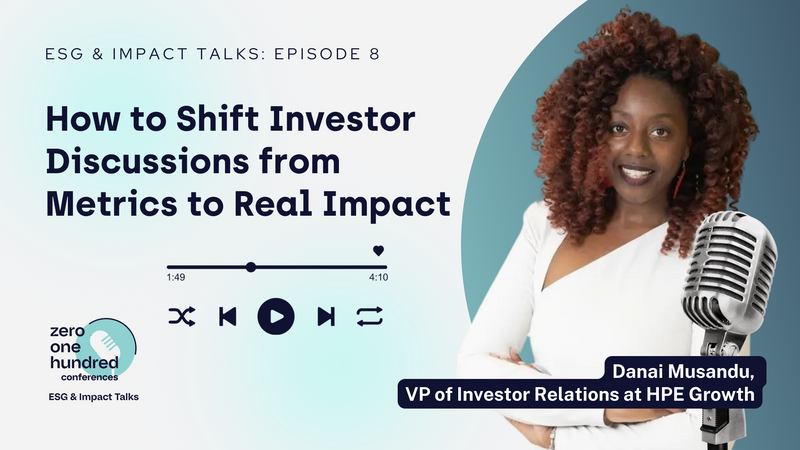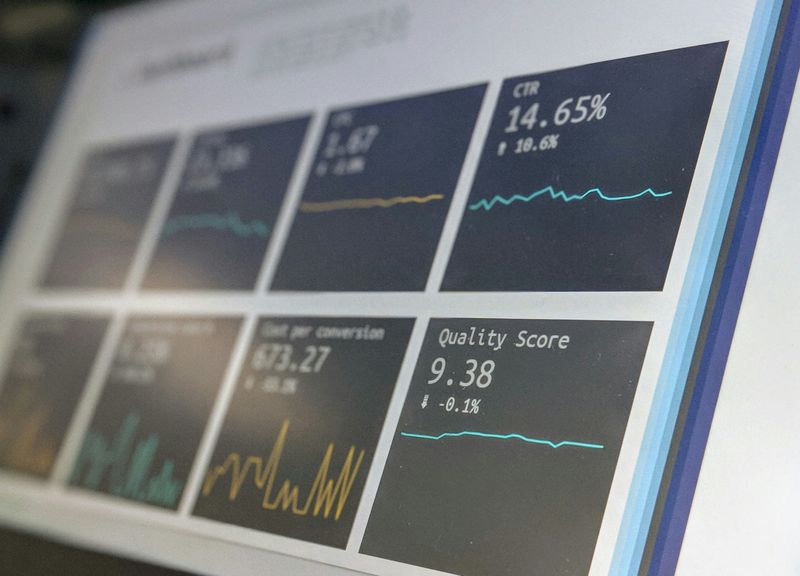Listen to this new episode of the Zero One Hundred ESG & Impact Talks with Danai Musandu, VP of Investor Relations at HPE Growth. In her role, she leads and supports the public and investor relations functions and her work entails fundraising and strategic communication. Before HPE, Danai was an investment and investor relations associate at Goodwell Investments, an early-stage technology private equity firm focused on emerging markets and impact investing. Originally from Zimbabwe, Danai has various passions, from mentoring early-stage businesses to sitting on advisory boards, Danai is an advisory member of Private Equity International.
In our conversation, Danai explores the evolving landscape of private equity, with a particular focus on ESG factors and their integration into investment strategies. As we navigate through her nuanced perspectives on the current state and future trajectory of impact investing, we gain valuable insights into the transformative potential of aligning financial goals with social and environmental objectives.
Listen full conversation here

Where do you see the current standing of the private equity industry concerning ESG and impact?
Well, so I think it's good to always look at these things in a time frame. And if we look at our whole industry and how that's evolved over years and years and years and years of developing what we understand as the financial industry, I think that ESG and impact is still a very small part of that journey within measurement and within interpreting what we see as value, whether positive or negative, outside of our typical P&L balance sheets.
So, I think ESG and impact are still at the beginning of the journey. And maybe that sounds a bit crazy because we've been talking about ESG and impact for more than 10, 15, 20 years, even if we're looking at the impact investing space, where you've had pioneers that were in that space beginning off within microfinance institutions. That's been years in the running and making, but I think what's happened now is that ESG and impact have become kind of table salt on your table, required and needed, and a part of what is framing the financial world.
However, it hasn't become so widely spread that all the other influences and nuances haven't fully come to create a fully-fledged ESG and impact, let's say, framework or metric that everyone can universally use the same way that we look at understanding profit and loss balance sheets or particular rules of accounting. And so, seeing it still, ESG and impact, they're teenagers, early teenagers, not babies, not toddlers, but still teens, figuring out basically what they are, what they want to be, what influences them, and what changes them.
So, we've got a mixed bag of multiple things. Part of it is good because it's good when you have lots of noise. In that noise, you will discern what you don't need and what you do need, and we get into the place of sharpening. So, you know, if we go with the analogy of a teenager, you know, you're still discovering who you are, hormonal, you know, figuring what it is before you become a young adult and as the journey will go on. So I think where we stand in private equity, in short, is more, we're still at the beginning of really developing what it is we want to see, how we want to interpret that, and what is meaningful at the end of the day. And I think at this point, the big questions are, why are we doing what we're doing? Why do we need so many metrics? Are those metrics valuable? Do we have really good information out there? And what's the actual purpose? What do we want it to communicate to us? And so we needed to get to that place.

I think we've come to that place in the industry where we're now asking a little bit more nuanced questions about ESG and impact that we might not have been asking before. Before it was more, you know, we should care about other externalities. We should care of things that are outside.
Let's think about a different category. Let's also consider other things outside of financial performance. What's happening in our society? How can we contribute to that? And how do we make that a part of our assessment? I think that that's where the conversation was beginning.
And those things are important to us. And now we've come to the places, why are we doing these things? Do we need these metrics? What value do they give us? What are we trying to understand when we have those metrics? It's more nuanced. And it's a developing and growing school of thinking that's now becoming more prolific in various asset classes.
And that's important. I think it's an important path that we're going through, where we are over-inundated with lots of different metrics and different frameworks. And we are beginning to sharpen, to become clearer as to where do we want to hold the standard. What's important for us? That was a very long response.
No, it was a very good and complete response. But I have a question. So you're saying we're heading to the point where we are asking ourselves, why do we need those metrics? And the question is, why do we need them? Yeah.
So I think that the question why we need that is because everyone always wants to know that the one dollar is equivalent to something, value, right? At the end of the day, money, finance, all of it is about value and emotion. Money is about feelings. Yes, we have frameworks. Yes, we do analysis and assessment. But there's always the bias that always comes in, which is feeling related as well in the emotional part. Why do we want to measure those things? Because we want to know that what we've done has value.
At the end of the day, finance is about value creation, taking one thing and making more on the other side, or at least keeping it equal and definitely not looking to make it negative because that wouldn't be great. But we want to be able to assess that. We also want to be able to be informed as to where should we be emphasizing things.
You know, the same way you can look at your P&L and see, well, the margins don't look great. Or you can assess and say, well, you know, revenue is not developing the way we want it to develop, or we might need to trim off some fat. I think we're also trying to get to that place, which is actually where is the best value with the investments that we can make that are also improving society? And I think that that's becoming more important because indeed we have a younger generation that has different considerations and cares versus an older generation.

So, I do believe we are going through what is more evidently a generational shift because we are in a digitized age. So, we can visibly see it and we can visibly feel the transformation and we can visibly see the evolutions and they're all vocalized and present in our world. And so, I think why they are important is because they are a reflection of what we as a society deem as valuable, right? So, we've gone from, you know, one dollar should make me two dollars to going to one dollar should maybe benefit the person who's disadvantaged too by giving them better access or my one dollar should not be going towards making the planet unsustainable and not livable.
We're becoming more conscious because as we're evolving as a generation, we're choosing to be a conscious generational group. And because of that, we value these things. We are now considering that there's more to our value or what we deem as valuable as a society outside of just financial performance. And that is not anything revolutionary or crazy or wild. Because if you think about it, it's always been part of our fabric. I think we just have a generation that is more intentional and wants to see that impact is positively happening within the space and not just in a negative way.
We can look at it through, let's say, even take HR and how that's evolved. You know, people do care about other values outside of I work for a great company. You would also look at, you know, what are the benefits that I get? Am I looked after well? What's the culture? That's all nuance that's being created because we're reflecting what we as a society care about. And I think that that's what the finance space is about, right? Even though we've looked at all the scandals that have happened, the 2008 crisis. I mean, we had the COVID period.
We've also had a downturn in the tech market just recently. More and more, we still want to see the things that we value being reflected most as a society. And I think that that's why ESG and impact are becoming more topical discussions. More so, if we look at it, who are the finance holders? Who are the wealth owners? We talk about the 1%. What does that 1% look like as the generations within those families are changing? Those are next gens, and they care about entirely different things. They aren't the people who created the money. Or if they are people who have created the money, they created the money in a particular context, a particular environment. And so, they care about different things. And they want their money to reflect the things that they care about. Money is feelings. We choose every day when we pay for something. We choose every day when we invest in something. We're choosing what we see as value, effectively.
So, this is just a reflection of our society, I think. Which is great, if we're going through these changes that are positive for everyone, not only for those who have the resources, then it's great. But then the question is, OK, so if these metrics are so important, then why ESG and impact are just staying? As teenagers, they are like Peter Pan, never grow. I mean, why? How can we make this conversation more effective? In the end, metrics, we just don't stay talking about metrics and talking about impact without actually going further.
Yeah. And, you know, I think the problem is that so part of the fact that we're having this generational shift, part of what this generation is about is also about instant gratification. Right. And we are expecting ESG and impact to evolve as quickly as we have seen, let's say, traditional asset classes or traditional metrics of assessments to evolve. And that's just a bit unrealistic. You know, we need to still get impact, let's say, impact investing or ESG considerations across every single asset class as a consideration for every single place investment happens so that you can get the feedback from everybody to sharpen it more. That hasn't happened in a very profound way yet. Right.
We're still there. I think a bit of it is that we want to get to the end without realizing that the process to get to the end is what is required for us to get to a very meaningful place. And so I see it as more of we are in a transitionary phase. And so we are expecting to have it all done and dusted quickly and have the perfect solution ready and available without realizing that this is just still part of the process. Let's look at Article 9. Right. And the SFDR that was done by the EU.
There are already conversations that after all the energy and effort that has gone into that and ensuring that fund managers are complying and that you can't greenwash or what the metrics are when you're assessing portfolio companies and so forth. I mean, so much energy has been put into that, creating a whole regulation and standard. They now discuss that that might be overturned. Right. And so that is part of it. It's the tension that needs to happen.
It's the push and pull, the push and pull till we get to a place that's a bit meaningful. Why are we also facing challenges? This is because the approach has predominantly been top-down. We're looking at it from the perspective of what are the LPs looking for. You know, what are the main holders of capital wanting and looking for? Then we go down to the GPs who try to execute because they want to present a product or service that is relevant to the LPs, and their clients.
And then you push it down to the portfolio and you are asking them to record or to measure things that might not be that closely linked to their work, but become cumbersome and extra. I actually think where the deeper learning, which I think they'll be beginning more of a shift and there is a bit of a shift that is that we need to have a bottom-up approach. Which is the operators on the ground who are the ones who create these amazing companies that want to have a social impact or that want to have an environmental impact.

What do they see as relevant and important to measure that success? And can we agree with that version of measurement of success? More so, I think what would be interesting as well is if we were to see the world's two worlds colliding. It sounds a bit crazy but go with me for a second because it's not fully formed. But let me go with it either way.
The world of philanthropy, if it was to meet with a world of finance in a way, and maybe people say that's what impact investing is, but it isn't. But if you look at NGOs, philanthropists, and foundations who spend a lot of time on the ground with people doing assessments, understanding what is actually making particular social fabrics tick or what's also breaking those social fabrics. If we had a way of actually understanding in society today, given work that's being done in, let's say, emerging markets, if we give it as an example, because mostly if we're talking about impact investing, quite a significant impact is, let's say, deeming from emerging markets.
If we were to say and look, and we give an example and say, most female smallholder farmers don't have access to financing. Maybe that's what they discover as an NGO with the work that they do, and they collaborate. Maybe that becomes interesting for a portfolio company that decides, I'm going to provide access to financing for women and they pay a micro amount for the access to that financing.
I help them to have a marketplace and I use it on a nice tech platform that they can have access to. This is a simple name and example. And then we move then over to the GP and you'd say, you know, maybe for that portfolio company, they say, you know, what's important metrics for us is actually the growth in the access of finance, because maybe it's inventory financing that they're giving these smallholder farmers. Or maybe they'll say, it's the number of women that we reach that's more important within these particular environments. That's how we measure our metrics. Then we can take it up to a level where we're saying, okay, that's what we're seeing valuable.
That's what's also related to what's happening on the ground in society. And that's where actually my money can have the greatest influence while still having a financial return. I think those things are important. Having a viable product that is giving access maybe to the underserved or people who didn't have better access at the end of the day or creating better processes that are better for our environment, for instance. So I think we need a bottom-up approach. That's the first one.
The second one is that not every metric is going to be relevant for every sector. There is so much nuance when we're looking at, let's say, fintech versus the digital health tech space. And looking for these massive aggregates, I think, has also not done justice to us. Because at the end of the day, everyone is running to get the big number of saying, I started off, so if we keep going with the example of the number of smallholder farmers, women, I started with five women when I invested and now there are 600 women that they reach. So we always want to aggregate, but sometimes we're always aggregating from sectors that don't speak to each other. We're trying to make a big, beautiful number because it sounds better.
And I think what we need to do is look at the quality of what it is we're effectively wanting to do and not getting bogged down in. It needs to be a big, beautiful, bold number, like a 3x or a 10x or a 30% IRR, whatever it is. And that's where we need to start considering maybe how do we combine those things in a way that does make a useful metric. Or maybe looking at it as individually, what does it speak to and where is that value? Taking the number to actually give it a quantifiable value for us in the meaning. And I think that that's where we sometimes are getting bogged down and where the challenges are as well.
Perfect. But I have a question about this bottom-up approach that you were mentioning, right? How can you bring this to the private equity world? Because in the end, the challenge in private equity is that you deal with established businesses, right? Where innovation, it's not as easy as you can have when you deal with a startup, for example. And there's also the part of the risk in private equity. They are less risk-takers than a VC fund, right? So how can you make this happen within the private equity? How can you make an impact, real impact happen in private equity?
I think that it starts off with a ripple, like a small stone cast in the water will always have a ripple effect. And that goes back to the point that I was saying that it can't all happen. We can't get to the end immediately. It's a process. I think within private equity, we have seen evolutions happening that are related to the context of what is happening in our world or environment.
If you think about it, before, not many people were thinking about ESG and impact or even thinking about having funds that were specific to that or LPs having dedicated pockets and pools. It's been a journey of conversations. It's also been a push from the clients and also generational shifts within those institutions as well that lead to that.
And so the idea of saying we have many established private equity firms and so forth, I think that a lot of firms acknowledge and realize that even if you're part of the establishment, you need to survive. And in this generation, where one tweet is going to determine whether you having a great Monday or not, I think that a lot of firms are aware that that is a shift that they're going to have to make. And you can already see it.
You can see how firms will think and talk about diversity, for instance. Inclusion becomes important. You have people that head up those departments. You're seeing that there are dedicated teams and people. ESG and impact are now becoming topics at universities that people are actually studying. So I think that it's naturally going to fall within these big institutions.
If anything, I'm sure those are even moving a lot faster ahead with it because for them to still survive, they need that. It's part of the branding. I think what we also need to realize is branding is so important in the psyche of this new generation, what you stand for, and what your values are. So I think it's going to be a normal kind of cost of business if I can say it plainly and lightly. I also do believe that we will start, yes, with the startups. Maybe we'll see it more within the VC space, that innovation coming through.
And you'll gradually see it within different pockets and places. I mean, at HPE, we also even have a digital climate fund and we're in the growth stage and we're seeing other growth players that are also bringing those. Yes, for sure, we may perhaps buy out at a later stage because they deal with maybe very established companies already that have been doing what they've been doing for many years, might be looking at more like, how can we put in better governance, better social parameters for workers that are in that place? How are we also conscious that the businesses that we're investing in aren't doing detrimental things to the environment? So more of a negative screening way that they'll apply that.

But what I do see more and more is that if the LPs are already creating pockets, dedicated pockets of capital for impact, right, it's only time that more and more GPs will be launching products that are relevant to that. And we already see it reflected that we're seeing younger entrepreneurs that are creating conscious businesses, that want to be sustainable. You know, being conscious is cool.
Conscious cool. OK, yeah, I think that's a bit of a ring for myself and a good laugh, but it is cool. Yeah, so I think that that, you know, that is part of it. I think what's more important to really understand is it's an evolution. You know, we won't get there today, but we'll get there tomorrow. And that is part of the journey. It's a sharpening. Our industry is going through that sharpening. Things are changing and shifting, and there'll be a new generation that will come after me. And we'll also talk about a shift and a change to something different.
What was this impact investing thing that they were doing? That's not even the it thing. Maybe it's going to be iconic investing or something that comes in later. What I'm trying to say ultimately is that we are a reflection of our time. And this is what is happening. We are just reflecting on what our value is in that time, in that time frame. So, yes, there are all these challenges.
And we are in the process of sharpening and making things better. I do believe that it would be a risk, actually, if you're going to be a firm that isn't going to consider ESG and impact from a talent perspective, from a product perspective, from basically what the market just wants. So it is a natural evolution that people are going to be moving within that space.
And it's a natural evolution that it will reflect what the generation wants. And we see it. I mean, we're here having a whole podcast about it. Why? Because it's relevant and it's becoming relevant to our industry. And it's making us think more of how we can be more conscious with how we invest or how we can. And maybe let me not say conscious, because then maybe it sounds all spiritual and strange and that's not what it should be. Basically, how can we create value that is reflective of what our society says is valuable today?
I really love your last reflection. Because it's true. I mean, the reason why we're talking about it right now in this podcast is because we want to put on the table something that's been running around. It's been touched as a topic, but we need to remember it like every day. So you were saying, and this is the last question, you were saying that we are changing the expectations and requests from future generations, current generations. They are different, right? So we're changing also the way we measure this success. So what do you think these future metrics of success will be? If you have to give four ideas for the future or as many as you want.
Well, it's going to be difficult for me to say what is going to be the metric. I can maybe speak about what it will express, right? So I would say the first part is, and I think more importantly, our values. So we will vote with our values. Do we like something? Do we not? Do we like the gas? Do we not like the gas? Do we like solar panels? Do we like oil? Do we like alternative modes of transport? Or do we still want fuel government cars? I mean, we're going to vote. We're going to express the society that we want to see. So value. I think that's one. The second one is most probably a version of an IRR, because we're in finance. We always want to see something on a piece of paper. We always love it to be on an Excel sheet somewhere. I think we'll most probably, I mean, and with the advent of AI and more and more people thinking about this and putting different data and information together, we might come up with some external rate of return or maybe a societal rate of return.
And that will be, you know, maybe a metric that we'd look at, you know, just our own existence as a fund manager and for the investments that we do. In what way have we, you know, contributed to society? And not just saying contributed to society in the sense that you've contributed to society because you've made donations or whatever. No, I'm not talking about that.
In the sense that you have made something better for our accessibility, for our engagement as a society, something that leaves a sustainable footprint. And I'm not talking about sustainability as tree-hugging, whatever. Something that has become useful for us in the way that we operate in our daily lives, in the way that we operate with people, in the way that better access is given. And the third one as well, that would be important. So I can only think in three. So before you think I'm going to have four for you.
So I said, so we've talked about value that reflect our society by choosing. The second one we've said is an external rate of return or a societal rate of return. Basically, something that would reflect that what we have created has added benefit or has been useful or has had an externality further than where we are today that is beneficial.
I think then the other one, which is a really big one, and maybe this is more from a personal standpoint for me. When I entered into the finance space and the investment space, coming from Zimbabwe and coming from an emerging market where things do operate differently. A big thing is about access and wealth generation.
And I would love to believe that part of the narrative of ESG impact investing that will be beneficial is if we actually saw a world where wealth was also in a way accessible for everyone, that people would have better access to investment opportunities to have the ability to be sustainable themselves. Or people just have an equal, not equal because it won't always be equal, but just the opportunity to have access. I think that that's important because we always talk about, even within private equity, we look at who has access to private equity.
Yes, you can make the argument, well, through our pension funds, when pension funds invest, we do have some sort of access. But the high net-worth individual has far more access in a different way than maybe a middle-class, upper-class, up-and-coming young professional has in terms of how they build their wealth. And I think that for me, that is a place I hope our industry will eventually come to, or at least discuss that when we are talking about value creation, value creation is also great when people have access to that value creation.

And so I am very excited that we have more digital platforms that allow people with small micro, let's say, investments to choose the brands or the products or the people that they care about and invest in those stories and also share in that value. And I think that that's important. I think what will also challenge our society and this transition that we're going through is that finance should be for everybody.
Financial literacy should be for everybody. It should be a right way to understand that the money you earn or your savings have value and meaning somewhere and you can choose to do something with that. And I think that's a big psychological and maybe I'm going more on a philosophical look within finance that I think is important.
But I do hope as part of that impact investing, we talk about access and access in a way that helps literacy globally, access in a way that gives opportunities for people to generate wealth or savings or whatever it is, or access in a way that people can choose to be part of great entrepreneurial stories that they feel connected to and can choose in that way. And not that we only have a 1% that controls all of that money and that value is only given back to them. And maybe that's a little bit on the edgy side to add as my final thoughts on it.






